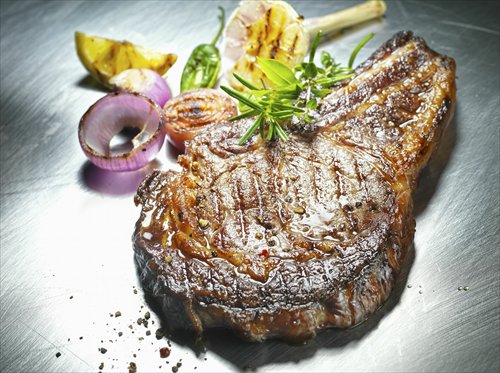Are cloned cows headed to nation’s dinner tables?
Steel company’s shares get a boost from investment in biotech firm

Photo: IC

Investors have fallen in love with the shares of Ningxia Xinri Hengli Steel Wire Rope Co in the belief that it's headed for biotech glory, but analysts wonder if people know what they're really buying or it's just another "concept stock".
The shares of Xinri Hengli, based in Northwest China's Ningxia Hui Autonomous Region, rose 9.99 percent to 16.52 yuan ($2.59) on the Shanghai Stock Exchange on Tuesday while the benchmark Shanghai Composite Index eked out a mere 0.16 percent gain.
It's not the first time the company's shares have closed limit-up. The shares were suspended on August 26 pending an announcement and resumed trading Thursday. Since Friday, they've risen by the limit each day.
Analysts suspect that the shares have gotten a boost from the company's investment, announced on October 27, in a stem cell subsidiary of biotech firm Boyalife Group, based in Wuxi in East China's Jiangsu Province.
On October 27, Xinri Hengli said in an exchange filing that it would invest 1.566 billion yuan for an 80 percent stake in that subsidiary.
A different subsidiary of Boyalife Group, in the cloning sector said on Sunday that it is building the world's largest commercial plant for commercially cloning animals in the Binhai New Area of North China's Tianjin, in cooperation with South Korea's Sooam Biotech.
Xu Xiaochun, chairman of Boyalife Group, told the Global Times Tuesday that the stake purchase deal with Xinri Hengli is not directly linked to the cloning plant in Tianjin.
"The capital market is important for the growth of the enterprise and Boyalife welcomes various cooperation with listed firms," Xu said via telephone conference.
Xu noted that stem cells and cloning are closely related fields.
The Tianjin plant is nearly 80 percent finished and will begin full production in the second half of 2016 with the goal to produce 100,000 cow embryos in the initial phase and 1 million in the long term, involving total investment of up to $1 billion.
The initial investment announced Sunday by the Boyalife subsidiary is 200 million yuan.
"The world has long benefited from the successful commercialization of plant cloning. Bananas and strawberries are examples. Cloning technology has fundamentally reshaped modern agriculture and now it is time for cloning technology to reshape husbandry," Xu said.
"Local cows are good for plowing the field and producing dried meat but not for steaks at the dinner table. Local milk cows have low output. So there is a need for cloned cows in China," Xu said.
According to a report issued by Beijing-based Zhiyan Scientific Information Consulting Co, Chinese demand for beef is expected to rise from 6 million tons in 2008 to 7.4 million tons in 2015.
Beef production, however, lingered at around 6 million tons in recent years.
But the cloning of animals has a low success rate.
"The world has yet to see industrial-level success of cloning husbandry animals. Success at the lab level does not mean the method can be transferred to the production line at a viable cost," Ma Wenfeng, an analyst at Beijing Orient Agribusiness Consultant, told the Global Times Tuesday.
"Let alone animals, there are not too many firms that can successfully propagate potatoes and flowers," Ma said, suggesting that breed improvement may be more economic for commercial use.
Although Xu said there is no close linkage between the cloning plant and Xinri Hengli's investment in the Boyalife stem cell firm, experts said it is possible that investors are connecting dots.
Wu Chenghui, a Beijing-based independent industry analyst, told the Global Times on Tuesday that Chinese investors values the inner links between subsidiaries and group holding firms.